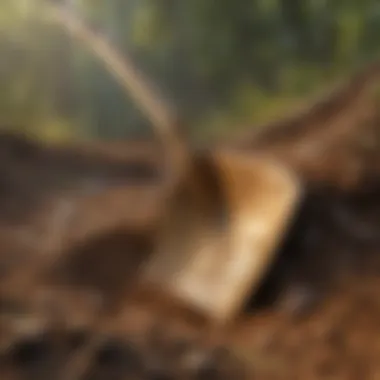Unlocking Tennessee's Golden Secrets: A Definitive Guide to Gold Prospecting


Rock and Fossil Identification
Tennessee's rich geological landscape offers a plethora of opportunities for rock and fossil enthusiasts to explore. When delving into the world of gold prospecting in this state, it is essential to familiarize oneself with the various types of rocks and fossils that may indicate the presence of precious metals. From quartz and pyrite to petrified wood and fossilized shells, each specimen holds the potential for uncovering hidden treasures. Aspiring prospectors should pay close attention to the distinct characteristics of these rocks and fossils, such as color, texture, and mineral composition, as they can serve as valuable indicators during the prospecting process. Equipping oneself with the right tools, including geology hammers, chisels, and magnifying lenses, can aid in the accurate identification of specimens, enhancing the overall prospecting experience.
Introduction to Gold Prospecting in Tennessee
Gold prospecting in Tennessee holds a significant allure, blending history with adventure in the quest for elusive golden treasures. Exploring the mineral-rich lands of Tennessee unveils a tapestry of stories encompassing the Native American influence, the gold rush era, and the enduring legacy of mining. Through a geological lens, understanding the formation of gold deposits, key topographic factors, and rock formations becomes paramount in navigating these golden terrains. Moreover, diving into the laws and regulations surrounding gold prospecting sheds light on permit requirements, environmental conservation mandates, and the essential practice of ethical considerations.
Historical Significance of Gold in Tennessee
Native American Influence
The Native American influence on gold prospecting in Tennessee signifies a historical continuum of reverence for the land and its treasures. Native practices in gold extraction lay a foundation for modern techniques, underpinning the intimate relationship between mankind and mineral wealth. Embracing these ancestral insights adds a dimension of cultural reverence and sustainability to contemporary prospecting endeavors in the region.
Gold Rush Era
The Gold Rush era heralded a transformative period in Tennessean history, fueling dreams of fortune and shaping the landscape through frenzied mining activities. Its legacy resonates through the veins of Tennessee, echoing the resilience and tenacity of prospectors who braved uncertainties for a shot at prosperity. Despite challenges, the Gold Rush era remains a cornerstone in the narrative of gold prospecting, highlighting both the opportunities and pitfalls that accompany the pursuit of precious metals.
Legacy of Mining
The legacy of mining in Tennessee casts a long shadow, reminding present-day prospectors of the industry's past glories and tribulations. From the echoes of pickaxes in forgotten mines to the reclaimed landscapes of modern conservation efforts, mining's legacy is a testament to human endeavor and environmental responsibility. By reflecting on this inheritance, prospectors can glean valuable insights into sustainable practices and the cyclical nature of resource extraction.
Geological Insights
Formation of Gold Deposits
Unlocking the mysteries of gold deposit formation unveils the intricate processes that have shaped Tennessee's subterranean riches. From hydrothermal activities to placer deposits, the formation of gold deposits showcases nature's artistry and geological complexity. Prospecting enthusiasts benefit from understanding these formations, strategizing their expeditions based on the geological signatures left by millennia of geologic activity.
Topographic Factors
The topographic factors defining Tennessee's gold-bearing landscapes dictate the success and challenges faced by prospectors. Elevation changes, water flow patterns, and soil compositions converge to create a tapestry of opportunity for intrepid explorers. Navigating these factors demands acumen and adaptability, ensuring that prospectors make informed decisions based on the dynamic interplay of topographic elements.
Understanding Rock Formations
Interpreting the nuances of Tennessee's rock formations emerges as a critical skill for aspiring prospectors seeking golden fortunes. Different rock types hold clues to potential gold deposits, guiding prospectors towards promising sites ripe for exploration. By honing their understanding of rock formations, prospectors elevate their likelihood of striking gold and unraveling the geological mysteries concealed beneath the surface.
Laws and Regulations


Permit Requirements
Navigating the regulatory landscape of gold prospecting requires a keen understanding of permit requirements and legal stipulations governing mineral extraction. Securing the necessary permits legitimizes prospecting activities, ensuring compliance with state and federal laws. Adhering to permit requirements not only safeguards prospectors from legal repercussions but also fosters a culture of responsible resource management and land stewardship.
Environmental Conservation
Environmental conservation stands at the forefront of ethical prospecting practices, advocating for the preservation of natural habitats and biodiversity. Aligning prospecting activities with conservation principles mitigates environmental impact, fostering sustainable coexistence between resource extraction and ecological preservation. By championing environmental conservation efforts, prospectors contribute to the collective responsibility of safeguarding Tennessee's natural splendor for future generations.
Ethical Practices
Ethical practices in gold prospecting encompass a spectrum of considerations, including respect for landowners, collaborative prospecting initiatives, and the dissemination of knowledge within the prospecting community. Upholding ethical standards fosters a culture of mutual respect and cooperation among prospectors, enriching the collective experience of engaging with Tennessee's golden landscapes. By adhering to ethical practices, prospectors nurture a harmonious relationship with both the land and fellow enthusiasts, promoting a shared ethos of integrity and goodwill within the prospecting community.
Tools and Techniques for Gold Prospecting
Gold prospecting is a meticulous craft that requires the right tools and techniques for success. In this comprehensive guide to gold prospecting in Tennessee, we delve into the essential equipment and methods that can help rock and fossil collectors unearth golden treasures effectively. Understanding and utilizing the correct tools and techniques is paramount in this pursuit to maximize efficiency and optimize results.
Essential Equipment
Gold Pans
Gold pans are indispensable tools in the arsenal of a gold prospector. Their design allows for efficient separation of gold from sediment, aiding prospectors in their search for precious metals. The circular shape and ridges of gold pans facilitate the swirling motion necessary to separate lighter materials like sand and gravel from heavier gold particles. This effectiveness makes gold pans a popular choice among prospectors for their simplicity and reliability.
Sluice Boxes
Sluice boxes play a crucial role in gold prospecting by providing a channel for the swift flow of water to wash away sediment while capturing heavier materials like gold in riffles. Their long and rectangular design enhances the process of separating gold from other materials, making sluice boxes a beneficial choice for prospectors seeking efficient recovery of gold. However, the size and weight of sluice boxes can be a disadvantage for prospectors on the move.
Metal Detectors
Metal detectors are essential for prospectors looking to detect metal objects buried beneath the surface. In gold prospecting, metal detectors help locate gold nuggets or deposits hidden in soil, stream beds, or crevices. The portability and precision of metal detectors make them a popular choice for prospectors exploring different terrains. However, metal detectors may sometimes provide false signals, leading prospectors on wild goose chases.
Prospecting Methods
Panning for Gold
Panning for gold involves the simple yet effective technique of using a gold pan to swirl sediment and water, allowing heavy gold particles to settle at the pan's bottom. This method is favored by many prospectors for its basic yet productive nature, making it an optimal choice for beginners and experienced prospectors alike seeking to uncover gold deposits.
Dredging Techniques
Dredging techniques involve the use of a sluice box or suction dredge to extract gold deposits from river beds or streams. By creating suction or a flowing channel, prospectors can effectively collect large amounts of gold-bearing sediment, increasing their chances of finding valuable gold particles. However, dredging techniques may be restricted in certain areas due to environmental regulations.


Dry Washing
Dry washing is a method that utilizes air to separate gold particles from lighter material without the use of water. This technique is advantageous in arid regions where water sources are scarce. By using a combination of vibration and airflow, dry washing allows prospectors to efficiently extract gold while minimizing environmental impact.
Advanced Strategies
Geophysical Surveys
Geophysical surveys involve the use of specialized equipment to map subsurface geology and detect anomalies indicative of gold deposits. Through the analysis of ground conductivity and magnetic fields, prospectors can pinpoint potential areas rich in gold, enhancing the efficiency of their prospecting endeavors. However, conducting geophysical surveys may require expertise and additional resources.
Sampling Techniques
Sampling techniques involve the systematic collection and analysis of soil or rock samples to determine the presence of gold and assess its quality and quantity. By taking representative samples from various locations, prospectors can gauge the potential of a specific area for gold prospecting. Proper sampling techniques are crucial in minimizing uncertainties and maximizing the likelihood of discovering significant gold deposits.
Using Magnetometers
Magnetometers are instrumental in detecting variations in the Earth's magnetic field caused by underlying geological structures, such as gold-bearing rocks or mineral deposits. By measuring magnetic anomalies, prospectors can identify potential sites for gold exploration and target areas with heightened concentrations of magnetic minerals. However, interpreting magnetometer data requires specialized knowledge and calibration to differentiate subtle signals from background noise.
Top Locations for Gold Prospecting in Tennessee
When delving into the realm of gold prospecting in Tennessee, understanding the significance of top locations is paramount. These areas offer prime opportunities to unearth golden treasures and have played a crucial role in the history of gold mining in the region. By focusing on top locations, prospectors can maximize their chances of success and hone their skills in identifying lucrative spots. Each location holds unique geological features, historical findings, and access points that enrich the prospecting experience. As we explore the top locations in Tennessee, it becomes evident that they serve as focal points for both novice enthusiasts and seasoned prospectors alike.
Coker Creek
In the scenic landscapes of Tennessee lies Coker Creek, a notable area for gold prospecting enthusiasts. One of the key attractions of Coker Creek is its abundance of gold-bearing creeks, which have been known to yield significant findings over the years. These creeks carry a storied legacy of gold deposits, making them sought-after destinations for prospectors seeking promising grounds. The historical discoveries in Coker Creek add to its allure, showcasing the rich heritage of gold mining in this region. Additionally, access points in Coker Creek are strategically positioned, providing prospectors with convenient entry to prime prospecting spots.
Tellico River
Tellico River stands out as a region with rich gold deposits waiting to be discovered. The allure of Tellico River lies in the bountiful reserves of gold that have attracted prospectors for generations. Recreational prospecting along the banks of Tellico River offers individuals a chance to enjoy the natural beauty of the surroundings while seeking out valuable gold deposits. Valuable tips for prospectors navigating Tellico River enhance the prospecting experience, ensuring that individuals can make the most of their time in this gold-rich region. The combination of abundant gold deposits, recreational prospects, and expert tips makes Tellico River a top destination for gold prospecting in Tennessee.
The Appalachian Mountains
Nestled within the grandeur of the Appalachian Mountains are gold-bearing streams that beckon to prospectors in search of hidden treasures. These streams hold the promise of uncovering hidden treasures that have eluded many over the years. The appeal of exploring the Appalachian Mountains lies in the sense of adventure and discovery that accompanies prospecting in this rugged terrain. While the notion of hidden treasures adds a touch of mystery to the prospecting experience, safety considerations remain paramount. Prospectors must prioritize safety measures when navigating the Appalachian Mountains, ensuring a fruitful yet secure expedition in pursuit of golden riches.
Safety and Environmental Considerations
In the realm of gold prospecting in Tennessee, emphasizing safety and environmental considerations is paramount. By prioritizing these aspects, prospectors not only safeguard themselves but also preserve the natural ecosystems for future generations. Understanding and adhering to safety protocols and environmental regulations are crucial steps in ensuring a sustainable and ethical gold prospecting experience.


Protecting Natural Habitats
Leave No Trace Principles
Embarking on a gold prospecting journey in Tennessee must align with the Leave No Trace Principles. This approach advocates for minimizing impact on the environment by leaving natural areas undisturbed. The principle of 'leave no trace' underscores the importance of preserving wilderness areas, promoting responsible outdoor practices, and fostering environmental stewardship. Adhering to these principles enhances the overall prospecting experience by maintaining the pristine beauty of Tennessee's landscapes.
Responsible Prospecting
Responsible prospecting involves conducting thorough research, obtaining necessary permits, and respecting landowners' rights. By following ethical guidelines and minimizing disruption to natural habitats, prospectors contribute to the sustainable development of the gold prospecting industry in Tennessee. Responsible prospecting enhances the reputation of prospectors and fosters positive relationships with local communities and environmental advocates.
Reclamation Practices
Reclamation practices involve restoring prospecting sites to their original state after operations cease. By re-contouring land, replanting vegetation, and mitigating environmental impacts, prospectors mitigate their ecological footprint and uphold responsible mining practices. Implementing reclamation measures ensures that the land retains its ecological integrity and supports biodiversity, making reclamation practices a crucial component of sustainable prospecting activities.
Personal Safety Tips
In the pursuit of gold in Tennessee, personal safety should always be a top priority for prospectors. Proper gear preparation, honing navigational skills, and understanding emergency protocols are essential for ensuring a safe and successful prospecting venture.
Gear Preparation
Before setting out for a prospecting expedition, thorough gear preparation is key. Choosing the right equipment, such as protective gear, communication devices, and first-aid supplies, can spell the difference between a smooth operation and a potential emergency. Prospective must prioritize safety equipment and gear reliability to mitigate risks in remote prospecting locations.
Navigational Skills
Navigational skills are crucial for traversing rugged terrains and uncharted areas in Tennessee. Prospector sera encouraged honing their map reading, GPS navigation, and compass skills to navigate safely and efficiently during prospecting excursions. By mastering navigational techniques, prospectors can confidently explore remote locations, reducing the likelihood of getting lost or encountering hazards.
Emergency Protocols
Familiarizing oneself with emergency protocols and procedures is non-negotiable for prospectors. Understanding how to respond to injuries, inclement weather, or other emergencies can make a critical difference in challenging situations. By being prepared with emergency action plans, communication protocols, and evacuation strategies, prospectors can mitigate risks and ensure their well-being during prospecting activities.
Community Guidelines
Respecting landowners, fostering collaborative prospecting efforts, and sharing resources are integral aspects of community guidelines in the world of gold prospecting in Tennessee.
Respect for Landowners
Respecting landowners' rights and properties is fundamental to maintaining positive relationships within prospecting communities. Seeking permission before prospecting on private lands, following designated access points, and adhering to landowner agreements demonstrate respect for property rights and enhance the overall prospecting experience for everyone involved.
Collaborative Prospecting
Collaborative prospecting involves sharing knowledge, expertise, and resources among prospectors to collectively improve prospecting outcomes. By collaborating with fellow prospectors, individuals can leverage collective insights, access new prospecting opportunities, and promote a culture of knowledge exchange within the prospecting community. Collaborative efforts can lead to enhanced prospecting efficiency and effectiveness for all participants.
Sharing Resources
Sharing resources, such as prospecting tools, techniques, and findings, fosters a sense of camaraderie and mutual support among prospectors. By sharing resources, prospectors can benefit from each other's experiences, expand their prospecting capabilities, and build a strong network of like-minded individuals. The exchange of resources promotes a culture of generosity, collaboration, and continual learning within the prospecting community.







